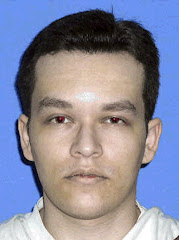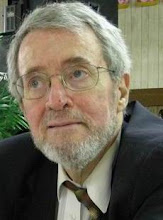We are all racists to one extent or another: biologists say it is "hardwired" into our genetic makeup. I hasten to say, "to one extent or another" because, although many of us grew up hearing racial epithets and, out of a sense of identity, some of us -- probably most, at least when young -- went along with the peer group. My grandmother, who died at 101 a decade ago, never made reference to African-Americans without calling them "nigras." Not "niggers," mind you, but "nigras." I think this was not because she didn't mean "niggers," but because her Texas dialect dictated a variant pronunciation. Her daughter, my mother, referred to her only sibling as her "sistah." My ancestors on that side of the family did not come from Alabama or Mississipi but from central Texas: Austin, in fact.
I was predisposed by such upbringing to mistrust and even disrespect "persons of color." My father instilled in me the notion that on some basic level the Declaration of Independence was correct in positing that "all men are created equal," not just all white people. And although I always suspected he had a racist bone or two in his body, I took his position to heart. When I was in college, I defied a city-wide ban on media coverage of a demonstration in front of downtown Fort Worth movie theatres designed to confront the owners' policy of allowing blacks to sit only in the balconies. When I was awarded journalistic society honors that year for my reporting in the college paper, my coverage of the protest was not the subject of my recognition for having penned the "Best Feature" and the "Best News Story." The same people who handed out the honors were employed by the media that agreed on the blackout.
And while I was not exposed to racial diversity in college -- I don't think our "foreign students" included anyone from African and other black-skinned nations -- I did graduate work at UCLA, as racial diverse an institution of higher learning both then and now as could be envisioned. One night I attended an off-campus party where people were smoking marijuana and I was asked if I wanted to share a joint. I said, "No thanks. My parents told me, if you smoke that stuff you'll move on to heroin sure as hell." At which point an African-American came through the kitchen door, ducking to allow his almost-seven-foot frame to miss the top of the sill.
He looked down at me and bellowed, "You talk too much!" I suddenly realized I had been put in my place by a UCLA basketball player named Lew Alcindor, who had just taken to calling himself by his Black Muslim name, Kareem Abdul-Jabbar. Non-plussed, I could only reply: "I think you're right." I did little talking for the rest of the evening.
A year or two later, I was in the Presidential Suite of the Ambassador Hotel, thanks to the daughter of a huge supporter of the Democratic Party, having drinks with the assembly of folks supporting Robert F. Kennedy, who was giving a speech in the banquet hall downstairs. When word broke on the TV of his assassination and death, the entire room erupted with an almost orgasmic wail of sorrow and grief. I looked about. The suite was liberally populated by African-Americans. I felt what they felt, but in subsequent years I had to reckon with nagging feelings I felt as I had because of the circumstances I had found myself in, that I was grief-struck because I felt it incumbent upon me. This would not diminish the fact that when word of the shooting came, my hand involuntarily gripped my glass so hard that it broke the tumbler, cutting me.
The murder of Martin Luther King did not surprise me, but every time I hear his "I have a dream" speech, I sob. The nomination of Barrack Obama as the Democratic Party's candidate for president is the most thrilling thing that has happened in this country since the election of J.F.K. It is the fulfillment of King's Dream. It is the promise of equality brought to fruition. Obama's speeches move me almost as much as memory of M.L.K. If he actually wins, racial justice will be seen to have advanced exponentially.
Which brings me to two persons I had hoped would both vote for him. Both are friends. Both are in their 70's. One, Marian, was a Hillary supporter; the other, Georgia, an independent who usually votes for Republicans. I had dinner with them prior to the primaries and asked Marian, "If Hillary isn't nominated, will you still vote Democrat?" She said, no, that she couldn't or wouldn't vote for Obama. Georgia said she didn't trust Obama, that he was all talk and no ideas. She would probably vote Republican again, even though it could mean four more years of Bushism.
After Obama was nominated, Marian continued to say she would "just stay home." Then, Obama named Biden as his running mate. That changed Marian's mind. She now planned to vote for Obama-Biden. Georgia's mind was not made up, but she still had serious reservations about voting for Obama. She cited his lack of experience, but I'd heard her refer to African-Americans as "N---rs," so I assumed that nothing Obama could say or do would change her mind. She just doesn't feel comfortable around black people.
In a way, Georgia represents a generation that is fading fast and will be replaced by open-minded, diversity-supportive people. Obama is not only a breath of fresh air, he is a symbol of things to come. He may lose, but his being so close to the White House is itself a sign of the times and a positive promise for the future.
Sunday, November 02, 2008
Subscribe to:
Post Comments (Atom)















No comments:
Post a Comment